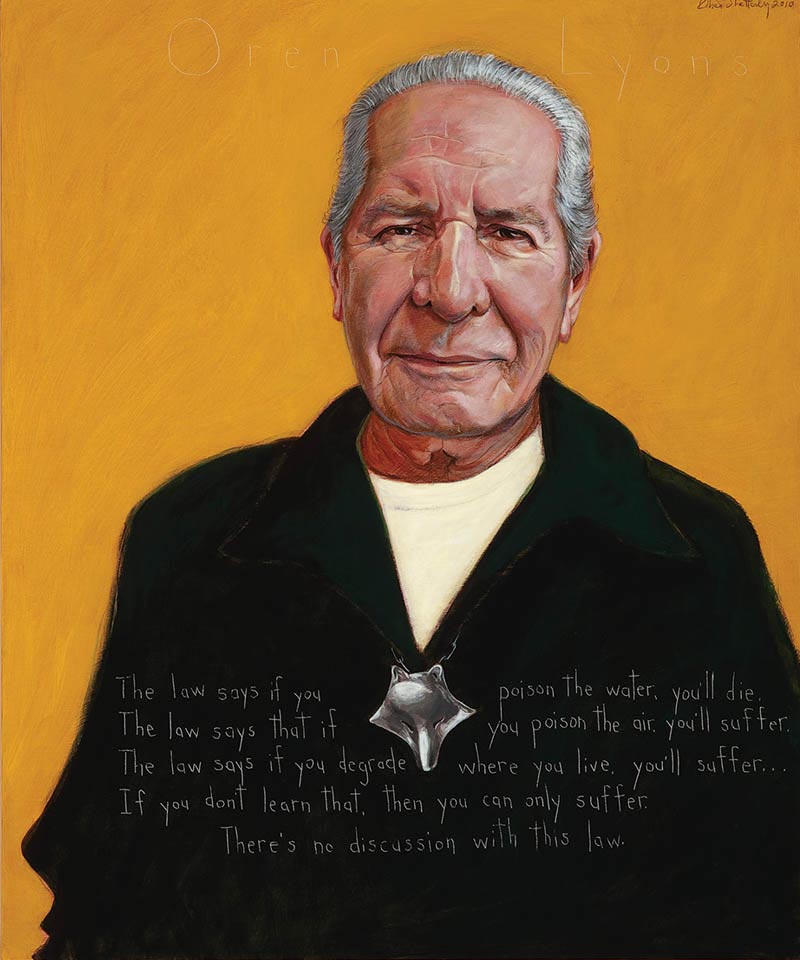
Oren Lyons
Native-American Faithkeeper, Human Rights Advocate, Environmental Activist : b. 1930
“The law says if you poison the water, you’ll die. The law says that if you poison the air, you’ll suffer. The law says if you degrade where you live, you’ll suffer. … If you don’t learn that, you can only suffer. There’s no discussion with this law.”
Biography
Oren Lyons is a member of the Onondaga and Seneca nations of the Iroquois Confederacy. As an activist for Indigenous and environmental justice, Lyons works with communities across the globe. As a faithkeeper, he upholds the history and traditions of the Turtle Clan of the Onondaga and Seneca. He often addresses modern-day conflicts by sharing traditional views on the laws of nature. When he says “You can’t negotiate with a beetle,”* he implies that nature will respond to climate change whether or not humans do.
Oren Lyons was born and raised on Onondaga and Seneca reservations in upstate New York. He later served in the U.S. Army before receiving a scholarship to Syracuse University. At Syracuse, he was an All-American athlete in lacrosse, a sport he continued playing with club teams for many years after graduating. Lyons’s athletic career had a jumpstart in his childhood games – lacrosse is traditionally played by the Iroquois.
After graduating from college with a degree in fine arts, Lyons moved to New York City to launch his career in commercial art.
In the 1960s, Lyons joined what has been dubbed the “Red Power movement,” a group of Native American activists who came together across tribal lines to draw attention to Indigenous rights and struggles. Upon reaching his forties, he returned to the land of his birth in upstate New York and to the cultural heritage of the Onondaga.
Throughout the 1970s, Lyons took a leadership role in Native American rights events, including the “Trail of Broken Treaties,” a caravan that traveled to Washington, D.C. to confront the Bureau of Indian Affairs. Increasingly focused on traditional practices and native culture, Lyons helped convene “the Traditional Circle of Indian Elders and Youth,” which still meets annually.
Lyons’s activist work connected him with other Indigenous groups around the globe, including the Maori in New Zealand. He helped establish the United Nations working group on Indigenous peoples in 1982. In remarks to the UN General Assembly in 1992, Lyons highlighted the Indigenous peoples’ struggle in an era of unrestrained growth. In the speech, he addressed key areas for improvement: the degradation of the environment, U.S. and Canadian treaty violations, and the misuse of Indigenous spiritual sites.
In addition to his international work, Lyons served as professor of American Studies and director of the Native American Studies Program at the State University of New York-Buffalo. As a scholar, he has published many books and articles, including children’s books. He edited Exiled in the Land of the Free (1992), which made the case for the influence of the ideas and values of the Iroquois Confederacy on American democracy and the Constitution.
Now retired from teaching, Lyons continues to inspire generations through his leadership in the Traditional Circle of Indian Elders and Youth and public speaking. In 2001, he addressed the U.S. Department of Energy Tribal Summit with the following words:
“We now observe that life upon this earth is experiencing a serious imbalance with systemic changes that imperil our lives, the lives of our children, and future generations. The issue of energy is a global problem, and therefore it requires global solutions. We must keep in mind that to meet these issues, we must think beyond our national borders and self interests. We must bear in mind that the United States is responsible for one quarter of the carbon output that impacts the world. We make a big footprint.”
Lyons’s dedication to the cause of Indigenous and environmental rights has garnered him many accolades, including an honorary degree from his alma mater, Syracuse University. Institutions including the Rosa Parks Institute for Human Rights and the National Audubon Society have also recognized Lyons’s work. He received the Ellis Island Medal of Honor in 1990.
*Bark Beetle, or Mountain Pine Beetle, infests lodgepole pine and other evergreens, eventually killing them. The beetles’ spread has been exacerbated by warmer temperatures that allow them to spread – research suggests that global climate change could be the root cause.
Programs
Americans Who Tell the Truth (AWTT) offers a variety of ways to engage with its portraits and portrait subjects. Host an exhibit, use our free lesson plans and educational programs, or engage with a member of the AWTT team or portrait subjects.

Education
AWTT has educational materials and lesson plans that ask students to grapple with truth, justice, and freedom.

Exhibits & Community Engagement
AWTT encourages community engagement programs and exhibits accompanied by public events that stimulate dialogue around citizenship, education, and activism.